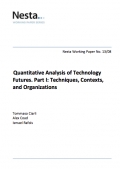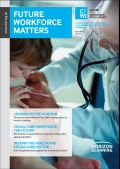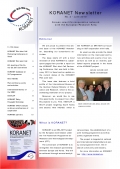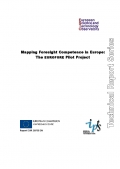Uploaded by Rafael Popper 5465 days ago Number of pages: 73 File's language: English Views: 602
No-one can predict the 21st century counterparts of quantum theory, the double helix and the internet. But there is little doubt that advances in science and technology will continue to transform the way we live, create new industries and jobs, and enable us to tackle seemingly intractable social and environmental problems.
Ten years into this new scientific century, the world is slowly recovering from a severe financial crisis. Food security, climate change and health inequalities are rising up international policy agendas. And countries such as China, India and Brazil are reshaping the economic and political landscape.
Faced with such uncertainties, the UK must build on its existing strengths. This country has a proud track record of achievement in science and engineering. Today, thanks to sustained investment, we have the most productive research base among the world’s leading economies. Our universities are ranked second only to those of the USA. And the outputs of our research are increasingly threaded through the economy. Over the last 15 years, our universities have responded enthusiastically to the challenge of transferring more of their knowledge into industry, and have given rise to a growing number of high- tech clusters. These developments are still quite fragile and, as was the case in the USA, will need to be nurtured carefully. It would be disastrous if, at this stage, there was a withdrawal of support for our world-class universities, or the incentives which have been put in place to encourage translation, commercialisation and knowledge exchange.
At the same time as we have improved our record on science and innovation, other countries have improved theirs. Our scientific leadership, which has taken decades to build, can quickly be lost. While the UK contemplates further reductions in spending on higher education and research, most other major economies, including the USA, China, France and Germany, have outlined ambitious plans to increase investment and boost their innovation performance.
Drawing on evidence, analysis and extensive consultation across the UK’s science, engineering and innovation communities, this report distils two urgent messages. The first is the need to place science and innovation at the heart of the UK’s long-term strategy for economic growth. The second is the fierce competitive challenge we face from countries which are investing at a scale and speed that we may struggle to match.
As the Royal Society celebrates its 350th anniversary, we want to provoke a richer debate about the contribution that science and innovation will make to the UK’s future. If the right policy choices are made now, the UK can remain at the vanguard of international science and secure its prosperity throughout the scientific century.
 State-of-art of sustainable innovation
State-of-art of sustainable innovation Sustainable Innovation Policy Advice
Sustainable Innovation Policy Advice CASI-F: Common Framework for the Assessment and Management of Sustainable Innovation
CASI-F: Common Framework for the Assessment and Management of Sustainable Innovation Your passport to the future!
Your passport to the future! The technology horizon: Preliminary review on technologies impacting the future health and social care workforce
The technology horizon: Preliminary review on technologies impacting the future health and social care workforce CfWI Future workforce matters - Issue 4
CfWI Future workforce matters - Issue 4 CfWI Future workforce matters - Issue 4
CfWI Future workforce matters - Issue 4 Science Foundation Ireland (SFI) Agenda 2020
Science Foundation Ireland (SFI) Agenda 2020 Quantitative Analysis of Technology Futures. Part I: Techniques, Contexts, and Organizations
Quantitative Analysis of Technology Futures. Part I: Techniques, Contexts, and Organizations myForesight: Malaysia's National Foresight Magazine (2nd Edition)
myForesight: Malaysia's National Foresight Magazine (2nd Edition) CfWI Future workforce matters - Issue 3
CfWI Future workforce matters - Issue 3 CfWI Future workforce matters - Issue 2
CfWI Future workforce matters - Issue 2 CfWI Future workforce matters - Issue 1
CfWI Future workforce matters - Issue 1 New Horizon Scanning Concepts, Practices and Systems
New Horizon Scanning Concepts, Practices and Systems KORANET Policy Foresight Workshop in Vienna/Austria
KORANET Policy Foresight Workshop in Vienna/Austria The Use of Strategic Intelligence and Horizon Scanning
The Use of Strategic Intelligence and Horizon Scanning iKnow ERA Toolkit (2011)
iKnow ERA Toolkit (2011) iKnow National Studies (2011)
iKnow National Studies (2011) iKnow Policy Alerts (2011)
iKnow Policy Alerts (2011) iKnow Interviews (2011)
iKnow Interviews (2011) iKnow Conference - Brussels, 27-28 October 2011
iKnow Conference - Brussels, 27-28 October 2011 Mapping Foresight Competence in Europe: The EUROFORE Pilot Project
Mapping Foresight Competence in Europe: The EUROFORE Pilot Project GFO 2007 - Global Foresight Outlook
GFO 2007 - Global Foresight Outlook OZONE: SPACE VISION
OZONE: SPACE VISION
iKNOW has been featured in the media and several research projects:
DIE ZEIT (Germany), Financial Times (Germany), El Heraldo (Colombia), Prospective Foresight Network (France), Nationalencyklopedin (Sweden), EFP - European Foresight Platform (EC), EULAKS - European Union & Latin America Knowledge Society (EC), CfWI - Centre for Workforce Intellience (UK), INFU - Innovation Futures (EC), Towards A Future Internet (EC), dstl - Defence S&T Laboratory (UK), EFSA - European Food Safety Agency (EU), Malaysia Foresight Programme (Malaysia), Bulletins Electroniques more...
